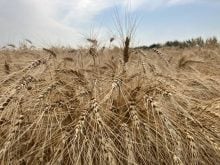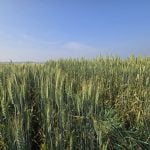MarketsFarm — Statistics Canada’s report on the country’s principal field crop stocks, released Friday, reflects an ever-tightening supply brought on by last year’s drought.
With the exception of corn and soybeans, all of the crops listed suffered a supply decline of at least 10 per cent compared to the year before, as of March 31. Canada’s supplies of canola, oats and barley were nearly cut in half.
“There wasn’t too much that you wouldn’t have expected because it’s a drought year,” MarketsFarm expert Bruce Burnett said.
Read Also

U.S. grains: Soy futures set 15-month high after China agrees to purchases
U.S. soybean futures reached a 15-month high on Thursday after President Donald Trump’s administration said top-importer China agreed to buy tens of millions of tons of American crops in the next few years as part of a trade truce.
Canola saw the largest decline, with 49.3 per cent less supply than a year ago at 3.94 million tonnes, as it bore much of the brunt of last year’s drought in Western Canada.
“Most of the pre-report estimates were about four million tonnes on stocks. This was tighter than what the market was expecting,” Burnett added.
Oats fell under one million tonnes at 947,000, 48.6 per cent less than the previous March. Barley lost 43.7 per cent of its supply over the past year, with a total of 1.7 million.
Wheat has the largest domestic supply out of all crops despite dropping 38.7 per cent to 10.1 million tonnes. Durum was especially hard hit, losing 49.1 per cent of its supply at 1.47 million.
Pulses and other specialty crops also saw their supplies cut down due to last year’s drought. Pea stocks were down 34.9 per cent to 1.22 million acres, while lentils dropped 34.1 per cent to 949,000. Flaxseed stocks total 185,000 tonnes, a yearly decline of 20.3 per cent, while rye totals fell 10.6 per cent to 193,000.
Corn was the only crop to substantially increase its stocks, a rise of 13.9 per cent to 9.28 million tonnes. Corn imports jumped 264 per cent over the year to 3.3 million tonnes, a record high for the period.
Soybeans held mostly steady with stocks increasing 0.1 per cent to 2.01 million tonnes.
— Adam Peleshaty reports for MarketsFarm from Stonewall, Man.













